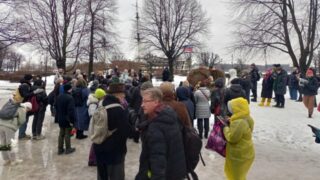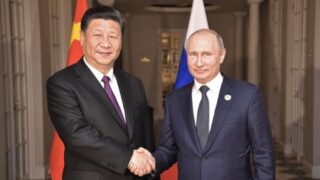Even the Orthodox Church in communion with the Patriarchate of Moscow called Ukrainians to resistance, comparing the Russian President to Cain.
by Massimo Introvigne


There is a religious aspect in the war in Ukraine, and some of its features are surprising and paradoxical. Others are not. In his first speech to the nation in which he announced the armed intervention, Putin evoked the link between the “Russian world” and the Orthodox Church led by the Patriarch of Moscow. He also offered as evidence of Western conspiracies in Ukraine the fact that in 2018 the Ukrainian Orthodox Church broke away from the Moscow Patriarchate and joined the other major world Orthodox jurisdiction, the Ecumenical Patriarchate of Constantinople, which is based in Istanbul, the ancient Constantinople.
Not all Ukrainian Orthodox accepted this decision. Some remained with the Patriarch of Moscow in the Ukrainian Orthodox Church of the Moscow Patriarchate. Putin stated that these Ukrainian Orthodox in communion with Moscow are being persecuted by the majority Ukrainian Orthodox Church and the government, and that one of the goals of his troops is to end the persecution.
About sixty percent of Ukrainians adhere to the Ukrainian Orthodox Church in communion with the Ecumenical Patriarch of Constantinople. A figure variously estimated at fifteen to twenty percent are part of the Church in communion with the Patriarch of Moscow. It should not be forgotten that there are also Catholics in Ukraine: over four million, a little less than ten percent of the population. They follow the Greek rite, meaning they have different traditions, canon law, and liturgical practices, but remain in full communion with the Holy See. There is also a significant minority of Catholics following the Latin rite.
To complete the map of Ukrainian Christians, there are almost ten thousand Protestant communities. There are also over nine hundred Kingdom Halls of the Jehovah’s Witnesses and the Church of Jesus Christ of Latter-day Saints, popularly known as the Mormon Church, has some forty congregations and one of its temples is in Kiev.
Of some relevance to understanding the war is also the religious situation in Russia. Here in polls over 60% of the population claims to be part of the Orthodox Church of the Moscow Patriarchate. However, this figure includes many who are rarely or never active in church activities, and the Moscow Patriarchate views with concern its loss of influence among the younger generations. Invited by political authorities or the Patriarchate itself, I was a speaker in several conferences in Russia on the causes of this phenomenon. My impression is that there are causes common to most European countries, which have been hit by more or less aggressive waves of secularization, and a cause specific to Russia, where many consider the Moscow Patriarchate to look too often like a public relations agency for Putin, a sort of “ministry of religion” of the regime.


Many Orthodox bishops, however, do not accept this analysis, which would require some self-criticism on their part. They attribute their problems to the aggressive competition of religions and “cults” imported from the West, whose numbers, however, are relatively small and statistically cannot explain the hemorrhage of active members that has hit the Patriarchate.
The more conservative bishops believe that this is part of a diabolical plan of the United States and the European Union to destroy the Orthodox soul of Russia. They have entered into an even closer alliance with the Putin regime, guaranteeing it unconditional support and receiving in exchange economic help in various official and unofficial forms, and restrictive laws to get rid of competition. They have led, among other things, to outlaw Jehovah’s Witnesses, who are the victims of a ruthless policy of arrests and violence condemned by all international institutions.
The same Russian Orthodox bishops perceived the move of the majority of Ukrainian Orthodox devotees from the Patriarchate of Moscow to that of Constantinople, which was largely due to the political crisis between Ukraine and Russia following the invasion of Crimea, as a wound caused by the usual American and European conspiracies. In Putin’s pseudo-republics of Donetsk and Luhansk, i.e. in the areas of Eastern Ukraine controlled by pro-Russian separatists, laws explicitly recognize the national character of the Orthodox Church in communion with the Patriarchate of Moscow, discriminating against the one in communion with the Patriarch of Constantinople and against other Christian and non-Christian communities. Some academic observers have called Donetsk and Luhansk “Orthodox mini-theocracies.”
It is therefore not surprising that Putin, by invading Ukraine, presented himself as the champion of the Russian Orthodox Church. He also presented the conflict as a religious war, one of whose objectives is to bring back all Ukrainian Orthodox into the fold of the Moscow Patriarchate. In recent years, after all, Putin has increasingly resorted to the old Russian rhetoric of Moscow as the “Third Rome,” the only Rome left standing after the fall of ancient Rome (which for Putin’s ideologues is also the moral fall of contemporary Western Christianity) and of Constantinople, thus the only remaining bastion of world Christianity.
Nor is it surprising that the Patriarch of Moscow remained silent for a long time and then made statements that were presented in the West as a call to peace but in Russia and Ukraine were interpreted, perhaps correctly, as expressing an ambiguous position and avoiding any criticism of Putin’s actions. It is also not surprising that some of the harshest words about this crisis have been spoken against Putin, calling the Ukrainian people to resistance, by Metropolitan Epiphanius, primate of the Ukrainian Orthodox Church in communion with Constantinople, and Patriarch Sviatoslav Shevchuk, head of the Greek Catholic Church, that is, of the vast majority of Ukrainian Catholics. Patriarch Shevchuk’s statements contrasted with the much more cautious position of the Vatican, which is concerned with not jeopardizing its ecumenical relations with the Patriarch of Moscow, while also keeping those with the Ecumenical Patriarch of Constantinople—which looks like a difficult exercise.


But there is something surprising. Very surprising indeed. It is the fact that the Ukrainian Orthodox Church of the Moscow Patriarchate, i.e., according to Putin, the very Church that Russian troops went to defend in Ukraine against the “persecution” of the majority Orthodox Church and the government, not only did not support the invasion but took a very tough stance against it. Metropolitan Onuphrius (Onufriy) of Kiev, primate of the Moscow-connected Church, said it is time for Ukrainians to put aside religious differences and unite to resist the invader. Onuphrius said that Putin is repeating “the sin of Cain,” who killed his brother Abel, that the invasion “has no excuses,” and that the Orthodox in communion with the Moscow Patriarchate must also offer their “special love and support to our soldiers who stand guard and protect and defend our land and our people. May God bless and guard them!” Note that this is a church including a majority of Russian-speaking Ukrainians, giving the lie to the theory that Russian-speaking Ukrainians support the invasion.


Apart from a few local Orthodox figures sold out or terrorized by the bloodthirsty hierarchs of the pseudo-republics of Donetsk and Luhansk, there is no Christian church or authority in Ukraine today that supports Putin. If the aggression aimed at further dividing the Christians of Ukraine into anti-Russians and pro-Russians, it has on the contrary united them in the execration of the Kremlin’s “Cain.”








